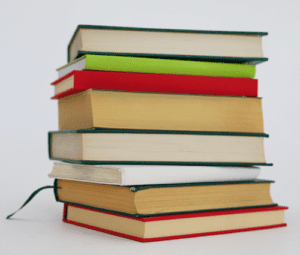Anna Miller, PhD

With the days getting shorter and the completion of the ASHG 2024 Annual Meeting, it’s the perfect time to approach the end of the year with renewed resolution! Use this time, to reflect and start the upcoming new year with focus and a genuine effort to form the habits you want by setting resolutions for your personal and professional growth! As always, when you decide to finally pick up that book to kickstart your reading journey in the new year, the ASHG Career Development Committee has you covered! The Nascent Transcript surveyed the current committee members and asked for book recommendations for trainees covering scientific breakthroughs, science history, personal development, and skills to succeed in graduate school. Below is a list of those recommendations in no specific order:
Why Fish Don’t Exist: A Story of Loss, Love, and the Hidden Order of Life by Lulu Miller: This memoir explores the life of scientist David Starr Jordan, blending personal narrative with philosophical reflections on science, order, and the search for meaning in a chaotic world. Trainees might find this book inspiring as it explores themes of perseverance through failure and the quest for understanding in both science and life.
Headstrong by Rachel Swaby: This is a collection of stories about women scientists who have made groundbreaking contributions to science, often overcoming significant barriers. This book is both inspirational and a reminder of the diverse and resilient people who have shaped the scientific field, offering valuable lessons on overcoming adversity.
Essentialism: The Disciplined Pursuit of Less by Greg McKeown: This book advocates for a minimalist approach to life and work, focusing on what truly matters and eliminating distractions, which can be helpful to prioritize and streamline tasks, and maintain focus.
The Smart Way to Your PhD by Dora Farkas: This guide offers actionable advice for navigating the academic journey, from getting into graduate school, to finding funding, to completing research and writing a dissertation. This book is good for early trainees looking for concrete strategies for productivity, overcoming common challenges, and managing the doctoral journey effectively.
Atomic Habits by James Clear: Clearly outlines a system for creating small, consistent habits that compound over time to create remarkable changes, which can be used to build productive research and writing habits.
Intuitive Biostatistics by Harvey Motulsky: Motulsky explains complex statistical concepts in an accessible way, using examples from biology and medicine to illustrate how to think about and interpret data. This book is a helpful resource to better understand and apply statistical concepts, without getting bogged down in technical details.
When Breath Becomes Air by Paul Kalanithi: This memoir is written by a neurosurgeon who was diagnosed with terminal cancer, reflecting on his life, his medical career, and the meaning of living and dying. This book offers deep philosophical insights that can help one reflect on their purpose, work-life balance, and the human side of scientific pursuit.
The Code Breaker: Jennifer Doudna, Gene Editing, and the Future of the Human Race by Walter Isaacson: This biography of Jennifer Doudna explores her groundbreaking work and provides insight into the process of scientific discovery and the ethical dimensions of new technologies.
– Anna Miller, PhD, Molecular Science Liaison at Caris Life Sciences
